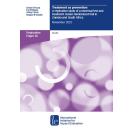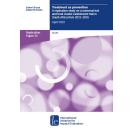Cash and change: a replication study of a cash transfer experiment in Malawi
3ie Replication paper 21, 2019
Unconditional cash transfers are increasingly held as a benchmark in development research and practice, against which, it is argued, other interventions should be compared for impact and cost-effectiveness. Baird and colleagues (2011) is one of few studies to test this assertion in practice. They empirically compare, using randomisation, the impact of unconditional to conditional transfers. This is a tremendous contribution to the literature on both approaches and disentangling the roles of the transfer versus conditionality.
Maira Reimão conducted a replication of the original study. The exercise was constrained by the fact that not all data used in the original study were accessible – while the dataset for the push-button replication is complete, only household survey data are publicly available in raw form. Nevertheless, the results are generally the same as in the original paper for the parts that are replicable, including the key finding that unconditional cash transfers decrease the likelihood of early marriage and pregnancy while the conditional cash transfers do not.
Apart from push-button and pure replication, Reimão also carried out a measurement and estimation analysis, and considered the effects on primary and secondary school girls separately – or, alternatively, on girls with stronger school attachment (i.e. closer to the expected grade for age) separately from girls with a history of repetition and/or dropouts (i.e. lower grade than expected for age).
She finds that the unconditional cash transfers decrease the likelihood of pregnancy and marriage among primary school girls and girls with a stronger attachment to school. However, the finding is specific. Those transfers decrease the likelihood only of marriage for secondary school girls and those with a weaker school attachment. The impact on marriage for secondary school girls is larger than for primary school girls. This is complicated by the fact that the effect is concentrated on girls who are the only beneficiaries in the household.
In terms of policy, these results indicate that unconditional cash transfers may be a powerful tool for decreasing pregnancy and marriage rates among teenage girls, but particularly for decreasing the likelihood of pregnancy among girls in primary school and with a strong attachment to school. The exploratory analysis also points to a warning regarding conditional cash transfers, as it might increase the likelihood of pregnancy among older girls.

